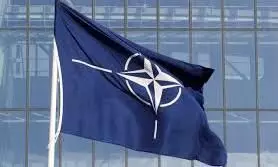
NATO turns 75
text_fieldsLast week on April 4, the North Atlantic Treaty Organization (NATO), completed 75 years. Although NATO's presence is currently known to the world as an alliance providing military support to Ukraine in the Russia-Ukraine conflict, it cannot be said that this platform has not made any quality interventions in international events as an alliance, except in a few instances since its formation. After the Second World War, 12 countries, including the United States and Great Britain, gathered in Washington on April 4, 1949, and formed NATO, and its membership grew to its present 32 through addition at different times. Each country becomes a member of the alliance by pledging mutual political and military cooperation. Finland and Sweden were the last to join. Although NATO came into existence in 1949 as a self-defence alliance, there are instances of it having resorted to aggression. For example, after the World Trade Center attack in 2001, NATO also joined the war front, roped in by the US in its war on 'terror'.. NATO adopted the US doctrine that the attack was not solely on the United States, and therefore required a joint war against its perpetrator, the Al-Qaeda. Thus, along with the United States, NATO forces took part in invading Afghanistan, where Al-Qaeda leader Osama bin Laden was hiding, and subjected that country to foreign occupation for twenty years.
Also read: A direct conflict between Russia and NATO will lead to WWIII: Putin
Today, primarily as an anti-Russian alliance, NATO is committed to mutual cooperation on the principle that any war against any member state is a war to be fought together. Turkey's objection to the membership of Finland and Sweden was for some time an obstacle; and any new membership had to be granted unanimously. Finally, they got the membership after the disputes were settled through negotiations. NATO has also made some noteworthy interventions. In 1995, the 12-day military operation against Serbia in Bosnia-Herzegovina led to the reining in of Serbia, which had been committing terrorist acts following the breakup of Yugoslavia. NATO's operation eventually changed the equation of war and finally restored the peaceful and independent existence of Bosnia-Herzegovina. NATO played a similar role in Kosovo in 1999. The UN-authorized NATO military operation paved the way for ending the reign of terror of Slobodan Milosevic, who was later convicted of war crimes, and for establishing peace in Kosovo.
Also read: Turkish parliament approves Sweden's NATO membership bid
Because NATO is basically a military pact, in the wake of Russia's invasion and seizure of Crimea in 2014, member states agreed to allocate 2% of their GDP to defence. However, only a few members fulfilled this promise. US President Donald Trump's interventions on this issue in 2019 caused cracks in the alliance. This also constituted a cause of friction within the alliance, as also the fact that NATO is unable to act with complete unanimity on the issue of Ukraine today. In the meantime, experience has shown that such decisions, which give ample room for the arms trade lobby, tend to inflame conflict rather than ensure peace. One of Russia's justifications for invading and conquering Ukraine was that it could not allow NATO to extend to its doorstep. The intent was its opposition to Finland's membership. Finland on the other hand was seeking protection against Russia, which was aggressively standing in its immediate vicinity and has a record of annexation of neighbours. The global order today is in such a state that there is no mediator to settle the problem. The fear of war can be removed only if the platforms or factors that can create an atmosphere of mutual trust in in a position to play a role. It is long since the UN has lost that role. We can only hope for international leadership with statesmanship to emerge to achieve that end.


















